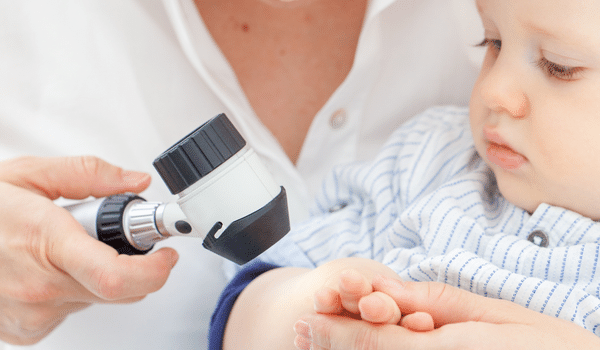You may be asking yourself “Should my baby see a dermatologist?” Let’s dive into pediatric dermatology and when it’s time to schedule an appointment for your baby to see a pediatric dermatologist.
Pediatric dermatology is when a dermatologist specializes in dermatology for children. Pediatric dermatologists have completed a fellowship in pediatric dermatology that trains them, not only in skin conditions specific to children, but also how to gently and efficiently conduct skin exams and procedures on children of all ages.
When Should I Take My Baby to a Dermatologist?
The three most common reasons you may be asking, “Should my baby see a dermatologist” are skin abnormalities, allergic reactions, and acne (yes, babies can get acne too).
- Skin abnormalities can include cradle cap, a large or abnormal birthmark, eczema, and warts. While these conditions are often harmless, you may want to seek treatment to help ease the symptoms.
- Allergic reactions are often another common condition that you may cause you to seek pediatric dermatologic care. Whether your child is suffering from hives or a rash, your pediatric dermatologist can help pinpoint the cause of the outbreak, including food, pollen, or environmental factors.
- Acne breakouts don’t just occur in teens and adults, babies also have them. No matter your child’s age, if over-the-counter treatments don’t work, the acne is affecting your child’s self-esteem, or the acne is inflamed or painful, it’s time to schedule an appointment with a pediatric dermatologist.
What Do Dermatologists Do for Babies?
Knowing what a pediatric dermatologist does can help you determine or not. A pediatric dermatologist can diagnose and treat conditions that affect a child’s hair, skin, and/or nails. This includes skin conditions such as birthmarks, eczema, allergic reactions, as well as treatments such as removing warts or cysts.
During your first visit, your pediatric dermatologist will discuss any of you or your child’s concerns. Once concerns are discussed and a skin examination has been conducted, a preliminary treatment plan will be created. A follow up appointment will be scheduled, and at this appointment, the treatment plan may be extended or altered depending on the treatment’s progress.
How Early Can Babies Develop Eczema?
Infants can develop eczema as early as three months of age. Howevr, eczema does not appear on some children until they are toddlers. Eczema, or atopic dermatitis, is one of the most common pediatric skin conditions. Eczema is an itchy skin rash that often affects skin folds such as elbows, wrists, and knees. While eczema can improve over time, it often continues into adulthood.
Should I Take My Baby to the Doctor for Eczema?
While there are at-home eczema treatments, including using fragrance-free skin care and detergents, seeking pediatric dermatology care can help you lessen and manage your child’s symptoms. If you’ve been treating the eczema for over a week with little to no improvement, you should take your baby to the dermatologist.
Your pediatric dermatologist may prescribe any of the following to manage eczema symptoms: over-the-counter moisturizers, prescription creams for inflammation, antihistamines for itching, or, for severe cases, oral medications. Goals of treatment focus on identifying and avoiding triggers, preventing infections, and controlling inflammation and itching.
When Should I Take My Baby to Urgent Care for a Rash?
You should seek immediate medical treatment if your child’s rash is accompanied by any of the following symptoms:
- Abnormal bleeding or bruising under the rash
- Streaks of red
- Headache
- Joint pain
- Fever
- Areas of tenderness
- Swelling or tightness in the throat
- Peeling skin or blisters in the mouth
- Shortness of breath
If your child is in need of dermatological care, contact our offices to schedule an appointment with our pediatric dermatologist, Dr. Elizabeth J. Froelich, one of the few pediatric dermatologists in Pittsburgh. You can reach our team at 412-429-2570 or visit our contact page to see all of our locations. You can also follow us on Facebook to learn more skin care tips and guidance and see what’s new in the world of dermatology.
Is this a close enough phrase to count as the main keyword?

